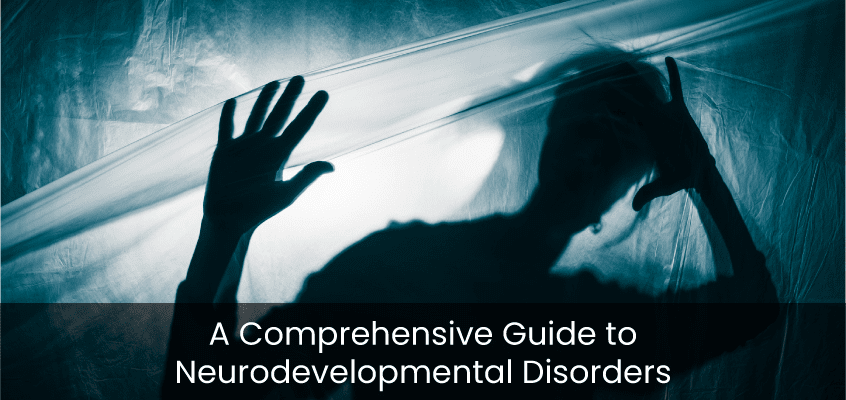Introduction
Neurodevelopmental disorders (N.D.s) affect how the brain and central nervous system work; they can range from mild impairments that allow those affected to live reasonably everyday life to severe conditions that may necessitate lifelong care. The extent to which a neurodevelopmental disorder can affect an individual can vary significantly from person to person. This article aims to give you a comprehensive guide to these disorders and help you stay informed and alert for any symptoms.
What are neurodevelopmental disorders?
Neurodevelopmental disorders are conditions that influence how the brain functions and alter neurological development. It can affect the individual’s social, emotional, and cognitive functioning. While some N.D.s like autism spectrum disorder (A.S.D.) and attention-deficit/hyperactive disorder (A.D.H.D.) are widely known and studied, others like cerebral palsy are not as commonly known.
The symptoms of most neurodevelopmental disorders begin to manifest in the early phases of development and can continue into adulthood. Most parents of children with N.D.s tend to ignore the symptoms, meaning these disorders go undiagnosed until later in life. A survey conducted in the U.S. among parents of children aged 3-17 found that 15% of the children were affected by a neurodevelopmental disorder.
Symptoms of neurodevelopmental disorders
As mentioned earlier, neurodevelopmental disorders’ symptoms often manifest in early childhood. However, there are exceptions like schizophrenia, where individuals at risk may show signs during their late teens or young adulthood. The symptoms of neurodevelopmental disorders differ among individuals.
Types and symptoms of common neurodevelopmental disorders
Here are some common types of neurodevelopmental disorders and their symptoms:
- Schizophrenia: Disorganised thoughts, hallucinations, delusions, and withdrawal from friends and family.
- A.D.H.D.: Distractibility, hyperactivity, impulsiveness, and inattention.
- Autism: Difficulty communicating, resisting human touch, self-harm, and little or no eye contact.
- Tourette’s syndrome: Grunting or coughing, shoulder shrugging, eye blinking, and other tics.
It is essential for parents of children of all ages to keep an eye out for any of these symptoms so that they can seek professional help as early as possible. It could also increase the chances of the child outgrowing the symptoms associated with N.D. and living everyday life.
Causes of neurodevelopmental disorders
Neurodevelopmental disorders appear to result from a combination of genetics and environment working to change the brain development in the individual. It is a well-known fact that N.D.s tend to run in the family. A child whose parent has a learning disability may be at risk of developing a neurodevelopmental disorder. Some of the most common causes of N.D.s are:
- Low birth weight
- Contaminants in the environment, such as lead
- Exposure of a foetus to alcohol, smoking, medication, and recreational drugs while in the womb
- Premature birth.
If a woman has a history of N.D.s in her family, it is crucial to be extra vigilant during any pregnancy and after her child’s birth. An individual should also consult a neurologist at the first signs of any neurological disorder to ensure greater chances of recovery.
Impact of neurodevelopmental disorders
The family of a child diagnosed with an N.D. will have considerable adjustments. Studies show that parents of children diagnosed with N.D.s report higher stress levels than those of children without N.D.s. This stress can impact the parents’ marriage, so they need to seek support in coping with the stress of having a child diagnosed with an N.D. Mindfulness techniques, marriage counselling, and other interventions can reduce stress and strengthen a marriage.
N.D.s are rarely curable, and the treatment options are few. Effective interventions will help an individual manage the symptoms of the disorder. These include:
Behavioural therapy
Applied behavioural analysis (A.B.A.), cognitive-behavioural therapy (C.B.T.), developmental therapy, and speech therapy can help manage the symptoms of N.D.s effectively. Psychotherapy and other behavioural therapies are used for adults diagnosed with disorders like A.D.H.D., while A.B.A. has shown more effective results in children diagnosed with A.D.H.D. or A.S.D.
Transcranial magnetic stimulation
Repetitive transcranial magnetic stimulation is a commonly used therapy for depression; it has also shown better social functioning in individuals with A.S.D. and tic disorders.
Medication
Children and adults may benefit from medicine prescriptions to manage the symptoms of N.D.s. These symptoms include agitation, inattentiveness, and hyperactivity. These medications may be stimulants, anti-depressants, or other drugs that can enhance cognition.
Alternative treatments like nutritional plans, recreational activities, and physical exercise can also help manage the symptoms of N.D.s.
Conclusion
A neurodevelopmental disorder can often start in childhood and persist throughout an individual’s life. These children may face challenges in forming relationships and being productive in school. They may also struggle with other social skills that should come naturally to them, limiting their ability to live and function in society.
Seeking expert help allows children to cope with their challenges due to N.D.s and live a whole life. Support from family, friends, and caretakers can also help improve their quality of life. Suppose you feel your child is displaying symptoms of a neurodevelopmental disorder. In that case, it is best to consult a healthcare provider or a mental health platform like United We Care, which connects you to psychologists who can answer all your questions and give your child the help they need in the comfort of your home. Contact an expert psychologist today!
References:
- https://www.epa.gov/sites/default/files/2015-10/documents/ace3_neurodevelopmental.pdf
- https://www.verywellmind.com/neurodevelopmental-disorders-definition-symptoms-traits-causes-treatment-5221231
- https://www.dignityhealth.org/las-vegas/services/neurological-care/neurodevelopmental-disorders
- https://www.ncbi.nlm.nih.gov/pmc/articles/PMC7365295/
- https://www.ncbi.nlm.nih.gov/books/NBK569702/
- https://dldandme.org/what-is-a-neurodevelopmental-disorder/
- https://www.sciencedirect.com/science/article/abs/pii/S0920996412006184









